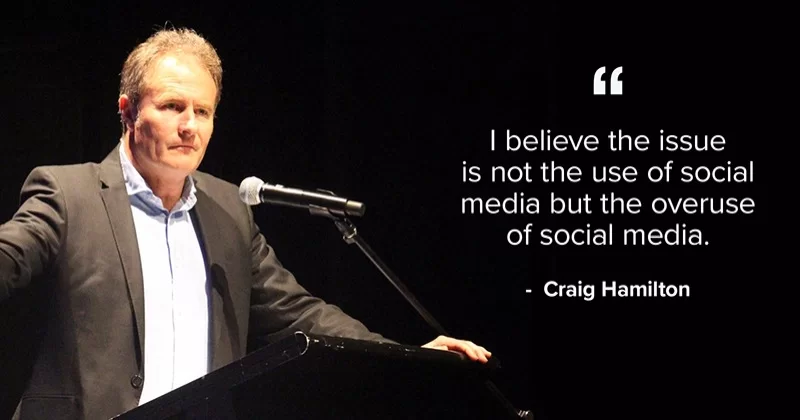Social media and its impact on mental health | Craig Hamilton | Health, Lifestyle & Wellbeing Speaker

In 2000, respected sports broadcaster Craig Hamilton was hospitalised after suffering a public psychotic episode. He was later diagnosed with Bipolar 1 Disorder, challenging himself, his family and employer. Since then Craig has become one of the nation’s leading mental health advocates and has written two biographies documenting his journey. Craig has spoken across Australia about the depths of his illness, depression, suicide and men’s health whilst campaigning for increasing support for those suffering from mental illness.
Here the Health, Lifestyle and Wellbeing Speaker discusses the effect social media can have on people’s mental health.
Does social media have a negative impact on our mental health?
There has been a great deal of focus lately about the impact social media usage has on our mental health.
In my view, social media is a wonderful way to stay in touch with friends, meet new people, promote your business and focus on the things that you’re passionate about.
I use social media but I’m very conscious about how much time daily I devote to the online world.
Does social media have a negative impact on our mental health?
In my view in many cases, absolutely.
I believe the issue is not the use of social media but the overuse of social media.
Facebook, Twitter and Instagram are probably the most common forms of social media but there are others. Snapchat, Reddit, Linkedin…the list goes on.
Giving every person multiple social media channels to spend time on.
In recent times Facebook’s founding President Sean Parker has commented that he knew they were creating something addictive that exploited “a vulnerability in human psychology.”
Parker described how in the early days of Facebook people would tell him that they weren’t on social media because they valued their real-life interactions.
And he would reply “OK. You know, you will be.”
He went on to explain that when Facebook was being developed the objective was: “How do we consume as much of your time and conscious attention as possible?”
It was this mindset that led to the creation of features such as the “like” button that would give users “a little dopamine hit”.
In my view, this is the crux of the problem
Dopamine is the naturally produced “feel good chemical“ that makes us feel great and a regular “hit” of dopamine can be highly addictive.
For all the positives that the use of social media provides the downside is the lack of attention we might pay to other areas of our lives and this need to get a “hit” of dopamine on a regular basis.
Facebook obviously isn’t in the same league as cocaine, speed or other illicit drugs which give you a high, but it can still provide a little “high” every day.
Social media can also validate someone’s view of themselves and raise self-esteem which for many kids who struggle socially can be very helpful in developing relationships.
The opposite can be true for the sensitive and vulnerable teenager who receives negative messages on social media.
Cyber-bullying is real and has resulted in tragic outcomes in some cases
There has been an increasing number of teenagers whose mental health has been negatively affected by online bullying.
The worst case scenario has been suicide.
Many parents are extremely concerned about their kid’s usage of social media and quite rightly so.
There is no quick fix to online bullying, but in my view, the short answer is to report it and block the perpetrator straight away.
Someone who bullies you has no place in your life.
Then find other ways to build self-confidence besides social media.
Learning self-defence is a great place to start. Not just so you can physically handle yourself but it really is a great way to raise self-esteem.
There are other downsides of excessive social media use.
When you’re looking at your Facebook, Instagram and Twitter feed you’re not exercising and exercise is good for your physical health and your mental health.
I find it staggering when I see a group of friends get together. I’m not just talking about the 12 to 18 years of age here, I’m also talking about many people in their 40’s and 50’s. There can be 4 or 5 friends sitting around a table having coffee and EVERY ONE of them is on an iPhone and not talking to one another.
Talking to each other is good for our overall mental health aside from the obvious benefits of maintaining our language skills.
So have a good think about it today. Do you overuse social media?